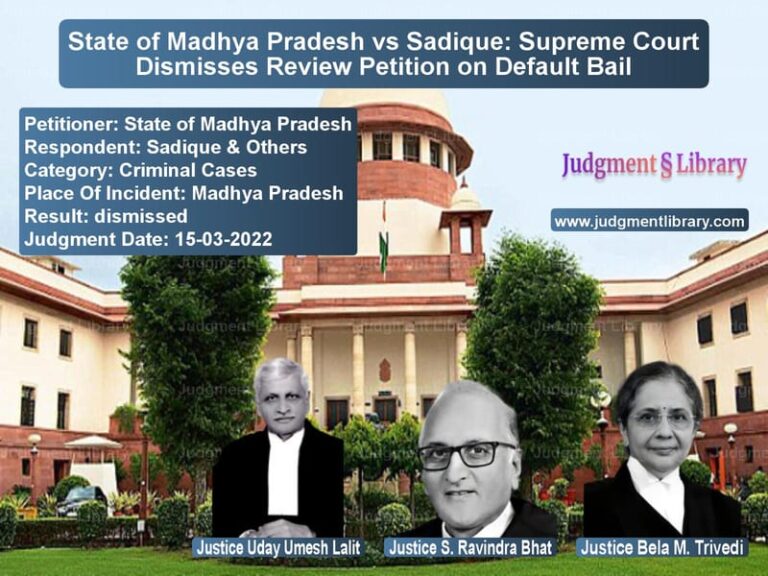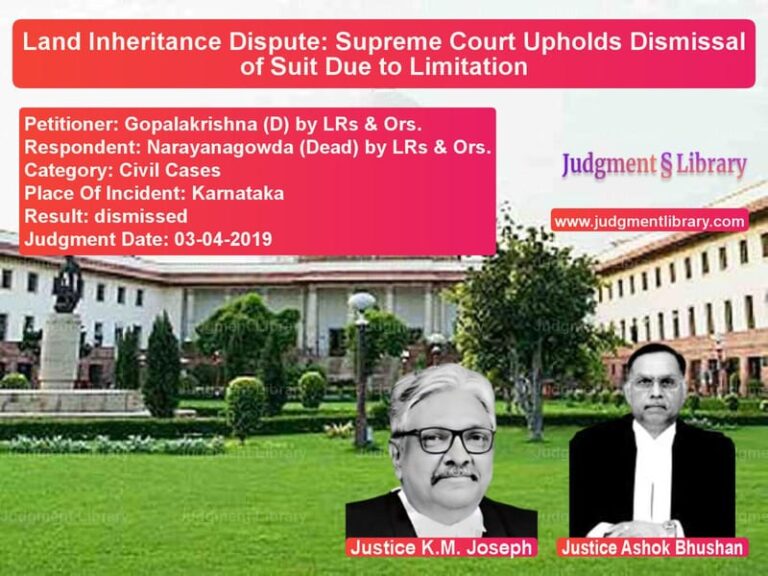Refund of Stamp Duty: Supreme Court Rules on Limitation and Equitable Relief
The case of Rajeev Nohwar v. Chief Controlling Revenue Authority, Maharashtra State, Pune and Others is a landmark judgment that addresses the refund of stamp duty and the limitations imposed by revenue laws. The Supreme Court of India had to decide whether a citizen who paid stamp duty but could not utilize the stamp paper due to legal proceedings should be denied a refund simply because of a limitation period. The case brings forth critical questions on equity, justice, and statutory interpretation.
The appellant, Mr. Rajeev Nohwar, had booked a residential apartment but later faced a dispute with the builder. This dispute led him to file a complaint before the National Consumer Disputes Redressal Commission (NCDRC). The litigation extended for years, and eventually, the appellant was allowed a refund of the price paid for the apartment. However, when he sought a refund of the stamp duty paid, the revenue authorities rejected his claim on the ground that the application was filed beyond the six-month limitation period prescribed under the Maharashtra Stamp Act, 1958. Both the revenue authorities and the Bombay High Court upheld this rejection, stating that the claim was time-barred.
Background of the Case
On April 24, 2014, Mr. Rajeev Nohwar booked a flat in a real estate project named Lodha Belmondo in Pune. The total agreed sale consideration was Rs 1,68,88,095. He initially paid Rs 33,91,795 by July 2014 and later paid Rs 1,58,28,221 towards the purchase. To facilitate the execution of the sale agreement, he purchased an e-SBTR (Electronic Secured Bank Treasury Receipt) stamp paper worth Rs 8,44,500.
However, disputes arose between him and the developer, leading him to file a consumer complaint before the NCDRC. An interim order was passed on September 25, 2014, restraining the developer from selling the flat to third parties. On May 6, 2016, the NCDRC ruled in favor of the appellant, giving him two options:
- Proceed with the agreement and receive compensation of Rs 10 lakhs from the builder.
- Seek a full refund of the amount paid, along with 12% interest per annum.
The appellant opted for a refund of the full amount along with interest. On July 11, 2016, the builder refunded the consideration, and on July 16, 2016, the appellant applied for a refund of the stamp duty paid. However, the revenue authorities rejected his application, citing Section 48(3) of the Maharashtra Stamp Act, which requires that an application for a refund be made within six months of purchasing the stamp paper.
Arguments Presented Before the Supreme Court
Petitioner’s Arguments
The appellant, represented by Mr. Varun Singh, argued that the six-month limitation should not be strictly applied to his case. He contended that:
- The stamp paper was purchased in good faith to complete the transaction.
- Due to the pending litigation before the NCDRC, he had to retain the stamp paper as evidence of his commitment to the purchase.
- The delay in seeking the refund was not due to negligence but rather due to circumstances beyond his control.
- The Supreme Court has the power to grant relief under Article 142 of the Constitution to ensure complete justice.
Respondent’s Arguments
The Chief Controlling Revenue Authority, represented by Mr. Rahul Chitnis, argued that:
- The appellant’s application for refund fell under Section 47 of the Maharashtra Stamp Act.
- Section 48(3) explicitly provides that such applications must be made within six months from the purchase of the stamp paper.
- Since the appellant did not apply within this period, the rejection was justified and legal.
- The revenue authorities had no discretion to overlook the statutory limitation period.
Supreme Court’s Analysis and Judgment
The Supreme Court examined the provisions of the Maharashtra Stamp Act, 1958, particularly Sections 47, 48, 52, and 52A. The Court observed:
- Section 47 provides for a refund in cases where the stamp is “spoiled” or rendered “unfit” for use.
- Section 48(3) prescribes a six-month limitation period for applications under Section 47.
- However, Section 52A allows refunds in certain cases where stamps are “not required for use,” subject to discretion by revenue authorities.
- The six-month limitation in Section 48(3) applies strictly to applications under Section 47, but not necessarily to applications under Section 52A.
The Court found that the appellant’s case did not fall strictly under Section 47, as the stamp paper was not spoiled but rather became unnecessary due to the court ruling. Therefore, the limitation in Section 48(3) should not have been applied.
Additionally, the Court invoked its power under Article 142 of the Constitution to grant relief, emphasizing that:
“A litigant has no control over judicial delays. A rejection of the application for refund would violate equity, justice, and fairness where the applicant is made to suffer the brunt of judicial delay.”
Final Ruling
The Supreme Court allowed the appeal and overturned the Bombay High Court’s ruling. It directed that:
- The appellant be granted a full refund of the stamp duty of Rs 8,44,500.
- The refund be processed within one month of the appellant submitting the e-stamp paper to the Collector of Stamps.
- The appellant be entitled to 6% interest per annum from July 16, 2016, until the date of refund.
Key Takeaways from the Judgment
- The Supreme Court reaffirmed that strict statutory limitations should not result in unjust outcomes.
- The six-month limitation under Section 48(3) applies only to cases under Section 47, not universally to all refund claims.
- Where refund claims do not fit neatly within statutory provisions, equitable relief may be granted under Article 142.
- Judicial delays should not unfairly penalize litigants seeking refunds.
- This ruling sets a precedent for future refund cases, ensuring that revenue laws are interpreted with fairness.
Conclusion
This case highlights the balance courts must maintain between statutory limitations and equitable justice. The Supreme Court’s decision ensures that a litigant who acted in good faith and faced delays due to legal proceedings is not unfairly penalized. The ruling reinforces the principle that while laws must be followed, they should not lead to unjust outcomes. With this verdict, the Court has established an important precedent in revenue law and refund procedures in India.
Petitioner Name: Rajeev Nohwar.Respondent Name: Chief Controlling Revenue Authority, Maharashtra State, Pune and Others.Judgment By: Justice Dhananjaya Y Chandrachud, Justice B V Nagarathna.Place Of Incident: Pune.Judgment Date: 24-09-2021.
Don’t miss out on the full details! Download the complete judgment in PDF format below and gain valuable insights instantly!
Download Judgment: rajeev-nohwar-vs-chief-controlling-re-supreme-court-of-india-judgment-dated-24-09-2021.pdf
Directly Download Judgment: Directly download this Judgment
See all petitions in Tax Refund Disputes
See all petitions in Banking Regulations
See all petitions in Judgment by Dhananjaya Y Chandrachud
See all petitions in Judgment by B.V. Nagarathna
See all petitions in allowed
See all petitions in supreme court of India judgments September 2021
See all petitions in 2021 judgments
See all posts in Taxation and Financial Cases Category
See all allowed petitions in Taxation and Financial Cases Category
See all Dismissed petitions in Taxation and Financial Cases Category
See all partially allowed petitions in Taxation and Financial Cases Category







